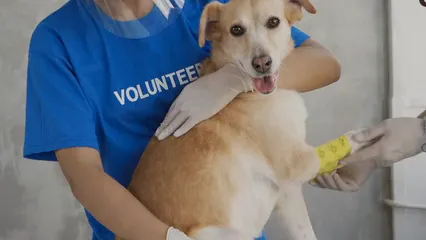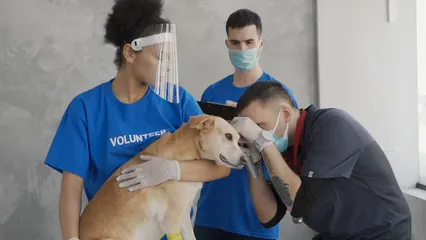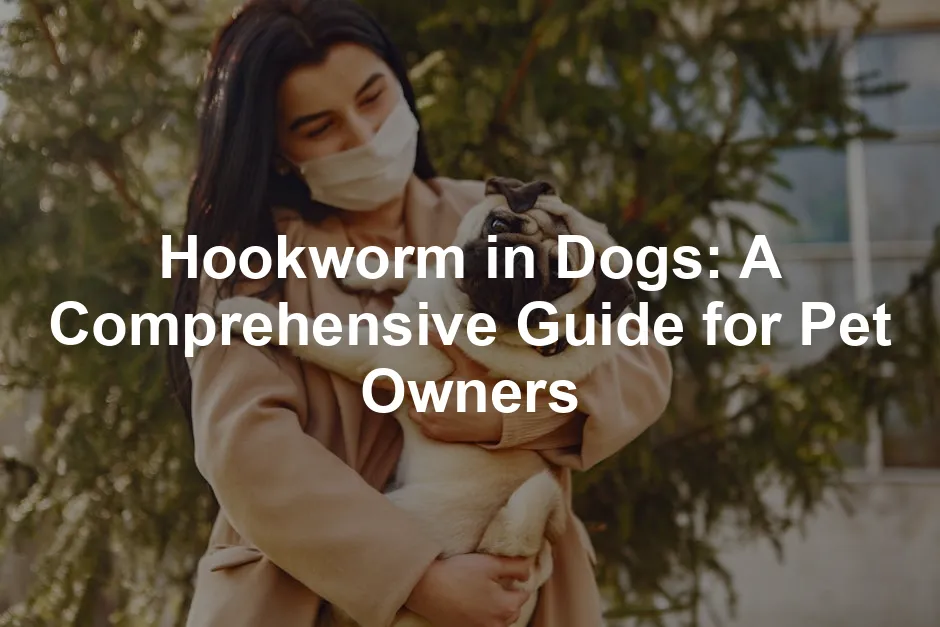Introduction
Hookworms are serious parasites that affect dogs. These intestinal invaders can cause severe health issues. Both adult dogs and puppies are at risk. Understanding their symptoms, treatment options, and prevention is vital for every pet owner. Awareness can protect your furry friend from these harmful infections.
Speaking of prevention, keeping your home clean is essential. You might want to consider using Nature’s Miracle Stain and Odor Remover. It’s a lifesaver for cleaning up after your pets and keeping your living space fresh and inviting!

Summary and Overview
Hookworms are intestinal parasites that primarily affect dogs. The main types include Ancylostoma caninum, Ancylostoma braziliense, and Uncinaria stenocephala. These parasites attach to the intestinal lining, consuming blood and leading to serious health problems.
The lifecycle of hookworms starts when eggs are excreted in feces. Once in the environment, these eggs hatch into larvae. Dogs can contract hookworms through skin penetration, ingestion of larvae, or maternal transmission during nursing or in utero.
Symptoms of hookworm infections include anemia, pale gums, weight loss, and gastrointestinal distress such as bloody diarrhea. Puppies are especially vulnerable and may show more severe symptoms.
For a more proactive approach to your dog’s health, consider Bayer Drontal Plus Dog Dewormer. This product can help keep your dog safe from these pesky parasites.

Diagnosis typically involves a fecal flotation test, which identifies parasite eggs in stool samples. Treatment usually consists of anthelmintic medications that kill adult worms, often requiring follow-up doses. Preventive measures include regular deworming, maintaining hygiene, and keeping living spaces clean to avoid contamination.
Understanding the various dog health issues related to hookworms is essential for effective management.
What Are Hookworms?
Overview of Hookworms
Hookworms are tiny intestinal parasites that can harm dogs. The most common types include Ancylostoma caninum, Ancylostoma braziliense, and Uncinaria stenocephala. These parasites measure about 1/4 inch to 3/4 inch long. They have distinctive hook-like mouthparts that latch onto the intestinal lining. Once attached, they feed on the dog’s blood, which can lead to serious health issues, especially in puppies.
Infected dogs often experience anemia and inflammation. Hookworms thrive in warm, moist environments, particularly where sanitation is poor. This makes understanding their nature crucial for pet owners.
While you’re at it, think about your dog’s comfort. Investing in a PetFusion Ultimate Dog Bed gives your pup the perfect place to rest and recover.

Lifecycle of Hookworms
The lifecycle of hookworms consists of three main stages: egg, larvae, and adult. Adult hookworms lay microscopic eggs in the dog’s intestine. These eggs are expelled through feces, contaminating the environment. Once in the soil, the eggs hatch into larvae.
These larvae can survive in the environment for weeks or even months, waiting for a host. Dogs can become infected by either ingesting the larvae or through skin contact. Once inside the dog, the larvae migrate to the intestine, where they mature into adults and continue the cycle by laying more eggs. Environmental factors, such as humidity and temperature, significantly affect their survival and maturation timeline.
Symptoms of Hookworm Infection
Clinical Signs
Hookworm infections can significantly impact your dog’s health. Symptoms vary between adult dogs and puppies. In adult dogs, initial signs often include anemia, which may manifest as pale gums and general weakness. You might also notice gastrointestinal distress. This includes bloody diarrhea and unexplained weight loss, both serious concerns.
Puppies, on the other hand, are particularly vulnerable. They may show more severe clinical signs, such as poor growth or failure to thrive. Skin irritations are also common, especially around the paws, where larvae may penetrate.
Recognizing these symptoms early is crucial. Immediate veterinary attention can make a significant difference in treatment outcomes. If you notice any of these signs, don’t hesitate to contact your vet. Early detection is vital for effective treatment and recovery.

To help maintain your dog’s oral health, consider using Vet’s Best Natural Dog Toothpaste. Healthy teeth can lead to a healthier dog overall!
Diagnosis of Hookworms
Diagnostic Methods
Veterinarians primarily use a fecal flotation test to diagnose hookworm infections. This test involves mixing a fresh stool sample with a special solution. If hookworm eggs are present, they will float to the surface, allowing for easy identification.
However, timing is essential. Hookworms need about two to three weeks to mature and start laying eggs. This means very young puppies might not show positive results right away, even if infected. Therefore, veterinarians may recommend follow-up testing if symptoms persist or if there’s a strong suspicion of infection.

Treatment Options for Hookworms
Medical Treatments
Treating hookworm infections typically involves anthelmintic medications. Common options include fenbendazole, pyrantel, and moxidectin. These medications are usually given orally and are effective at eliminating adult worms.
However, one treatment is often not enough. A follow-up dose is required two to three weeks later to target any newly developed adults from existing larvae. In severe cases, especially with significant anemia, additional care may be necessary. Blood transfusions could help restore lost blood volume, and supportive treatments might be needed to aid recovery.
It’s crucial to follow your veterinarian’s advice on treatment timelines and additional care. Regular check-ups can help ensure your dog remains healthy and free from these parasites.

Managing Severe Cases
Severe hookworm infections can lead to anemia in dogs. If your dog shows significant weakness or pale gums, immediate veterinary care is crucial. In extreme cases, blood transfusions may be necessary to restore healthy blood levels. These transfusions can be life-saving, especially for young puppies suffering from severe blood loss.
In addition to transfusions, supportive care is vital. This may include intravenous fluids to prevent dehydration and medications to manage pain or discomfort. High-protein diets can also help rebuild your dog’s strength and support recovery. Regular check-ups will ensure your dog is responding well to treatment and on the path to recovery.

To ensure your dog is well-equipped for outdoor adventures, consider investing in a Paws Aboard Doggy Life Jacket. Keeping your dog safe while having fun in the water is a must!
Conclusion
Awareness about hookworms in dogs is crucial for every pet owner. These parasites pose serious health risks, especially for puppies. Regular veterinary check-ups help catch infections early. Your vet can provide timely deworming and health assessments, ensuring your dog stays healthy.
Prevention is key. Keeping your dog’s environment clean and monitoring for symptoms can make a big difference. By staying vigilant, you protect your furry friend from these harmful parasites. Don’t wait—schedule that vet visit today!

If you’re looking for a fun way to keep your dog entertained and mentally stimulated, check out the Outward Hound Hide-A-Squirrel Puzzle Toy. It’s a fantastic way to keep their mind sharp while having a blast!
Frequently Asked Questions (FAQs)
Can hookworms cause serious health issues in dogs?
Yes, hookworms can lead to significant health problems. They attach to the intestinal lining, causing blood loss and anemia. This is especially dangerous for puppies, who may suffer severe symptoms or even death without prompt treatment.
How do I know if my dog has hookworms?
Signs of hookworm infection include pale gums, weakness, and gastrointestinal issues like bloody diarrhea. If you notice these symptoms, contact your veterinarian for a diagnosis and treatment.
Are hookworms contagious to humans?
While adult hookworms do not infect humans, their larvae can penetrate skin, causing “ground itch.” In rare cases, they can migrate to internal organs, leading to serious health issues. Good hygiene practices can help prevent transmission.
What treatments are available for hookworm infections in dogs?
Veterinarians typically prescribe anthelmintic medications, which are effective at eliminating adult hookworms. Treatment may require follow-up doses to ensure all worms are eradicated, especially if your dog is anemic.
How can I prevent my dog from getting hookworms?
Prevent hookworm infections by maintaining a clean environment, regularly deworming your dog, and keeping their living area free of feces. Consult your vet about appropriate deworming schedules and preventive medications.
For those long car rides, don’t forget a Dog Seat Cover for Cars. It keeps your car clean while your furry friend enjoys the ride!
Please let us know what you think about our content by leaving a comment down below!
Thank you for reading till here 🙂
All images from Pexels





